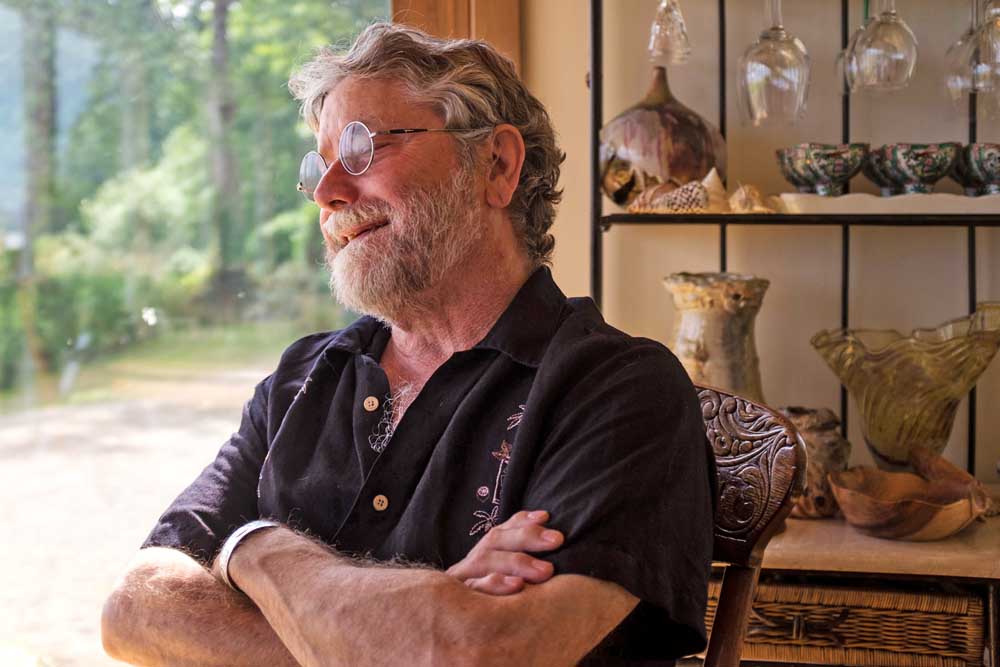China Beach: Time for creativity, reflection on shore of Baker Bay
Published 6:33 am Wednesday, September 26, 2018

- Of his 40 years operating the historic Shelburne Inn with partner Laurie Anderson, Campiche said, “There are so many guests that we loved. There were beautiful relationships. That's what always sustained it.”
ILWACO — “Not exactly what a smart person would choose to make a living at, but what can I say?” asked David Campiche, as he looked over one of his hand-thrown pots on the table before him. Art was his first love. And for awhile, it did sustain him. “Although, when I was a kid, I guess, I made a living at it.”
It was the late 1960s while Campiche was studying painting and art history in New York, when a chance meeting with famed ceramic artist Toshiko Takaezu, who taught at Princeton, changed his artistic course.
“She about turned us all on our heads in about 30 seconds,” he said. “She just had presence. That fall that’s all I did in school was throw pots.”
After returning to the Peninsula a few years later, Campiche, and long time partner Laurie Anderson, purchased Seaview’s Shelburne Inn in 1977. Campiche chalks up much of their success with the historic lodge, which was built in 1896, to Anderson.
“She’s so brilliant. Her ideas and schemes,” he lightly chuckles.
A few years back, Campiche and Anderson hired managers to run the hotel and restaurant for them, but was short-lived and didn’t work out. Then last year — their 40th running the Shelburne — they were approached by Brady and Tiffany Turner — owners of multiple area hotels — who agreed to a three-year lease of the historic inn, with an option to buy.
“It’s like this, I’m 70, and 16 hour days are just really hard on the body,” he said.
Campiche and Anderson were far more than just owners, as they also operated the hotel, as well as the kitchens and the pub.
“We’d be here in the evening, serving tables. Or if the chef didn’t show up, have to go back and cook. It was always a challenge,” Campiche said fondly. “Laurie baked, and we taught a culinary class, and she was on every committee, because she’s so damn intelligent.”
But what may have been the biggest joy over the last 40 years, Campiche said, was the return guests.
“There are so many guests that we loved. There were beautiful relationships. That’s what always sustained it,” he said.
It’s been six months since Campiche and Anderson gave up the day to day operation of the Shelburne. Campiche said he’s had more time for pottery, which he likes. Most recently, he had to prepare for a career retrospective show being held at the Columbia Pacific Heritage Museum, now through Oct. 6.
“It’s a big exhibit. It’s really quite wonderful,” he said of the show which features pottery by him and paintings by Eric Wiegardt. “Very honored,” he said.
He also recently had some of his pottery displayed as part of the annual Music in the Gardens tour. Inside the China Beach Retreat — a small lodge along the tidelands of Baker Bay in Ilwaco that Campiche and Anderson have owned for about 20 years — pieces of Campiche’s pottery are interspersed among the various paintings and Native American art.
“Solicitous,” he jokes, dryly.
But just as he was getting some free time back, Campiche has been back at work.
Milt Parham, former executive director at Klean treatment center in Long Beach, recently purchased what was previously a senior assisted living center at 8th Street N and Washington Blvd. in Long Beach, and is reopening it as Discover Recovery treatment center. Parham reached out to Campiche to see if he would set up the kitchen. To which Campiche, of course, obliged.
“I said I would do that for awhile. There should be around 30 people and I’ll cook for them,” he explained.
When asked why he would want to jump back into work after just jumping out, Campiche said, “I don’t know, it was a neat challenge. Could be fun for a while.”
Staying busy is rarely a challenge for Campiche, who for years, between his time running two lodges, and working as a potter, also has worked as a freelance writer for the Daily Astorian and Coast Weekend, including writing the recurring Close to Home column. A few months ago he wrote about new scientific studies that shows how interconnected all living things are.
“They’re finding that trees carry messages and they warn other trees,” he said of the article. “I thought maybe (his readers) would finally think I flipped out.”
An average day is still a busy one, as Campiche regularly finds himself down at China Beach in the mornings, cooking breakfast for his guests, returning home to write for a few hours, cooking lunch for someone else, before returning to China Beach to check people in during the afternoon. He said stepping away from the Shelburne didn’t necessarily make him less busy, just a different kind of busy.
“And I’m trying to finish up a novel,” Campiche added casually.
But most of all, he said he has no plans to “slow down,” because, “I don’t work well slowing down.”


